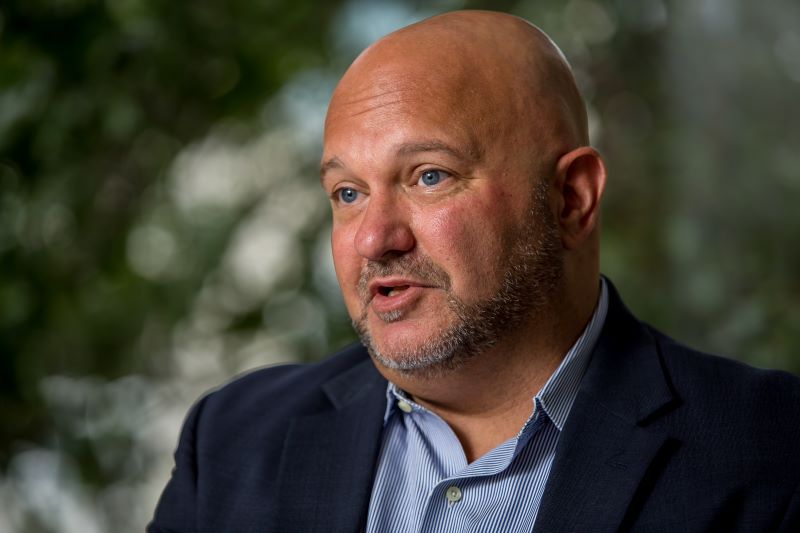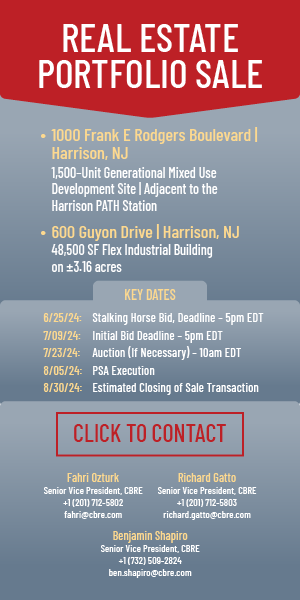Dan Kennedy is now at the helm of NAIOP New Jersey after taking over as CEO on Aug. 1, with plans to tackle a host of key public policy issues and visions of bolstering what is already one of the commercial real estate association’s strongest and most-respected local chapters. — Photos by Aaron Houston for Real Estate NJ
By Joshua Burd
Dan Kennedy wasn’t in the market for a new job. In fact, he said, after nearly six years at the Utility and Transportation Contractors Association of New Jersey, he was every bit as passionate about the importance of infrastructure in the state and representing those who build it.
Then Mike McGuinness came calling, seeking his own successor as CEO of NAIOP New Jersey.
“When somebody like Mike taps you on the shoulder, you kind of have to listen,” said Kennedy, who had risen to become a senior director with UTCA. “NAIOP as an organization, I think, really aligns with my personal values and skillset, so it just seemed like a natural fit.”
The job was all the more appealing after he got to know the chapter’s in-house team and trustees.
“Mike is obviously a key figure in the industry, but he’s the first to say that the team is strong, the board is strong, the organization is fiscally strong — and all those variables really were very strongly in favor of me coming over here.”
Just a few months later, Kennedy is now at the helm of NAIOP New Jersey, having assumed the CEO role on Aug. 1 after a six-week transition period. That means the veteran planner and public policy expert is fully immersed in the job, with a full plate of advocacy issues and visions of bolstering what is already one of the commercial real estate association’s strongest and most-respected local chapters.
“I think the things we do well now are pretty well known — our education, our networking, our advocacy,” he said. “But within those buckets, are there things that we can be doing better and different? I think it’s really important to listen to your members and hear what they think. … And I think the mark of a strong organization is being willing to evaluate and improve even when you’re not forced to.”
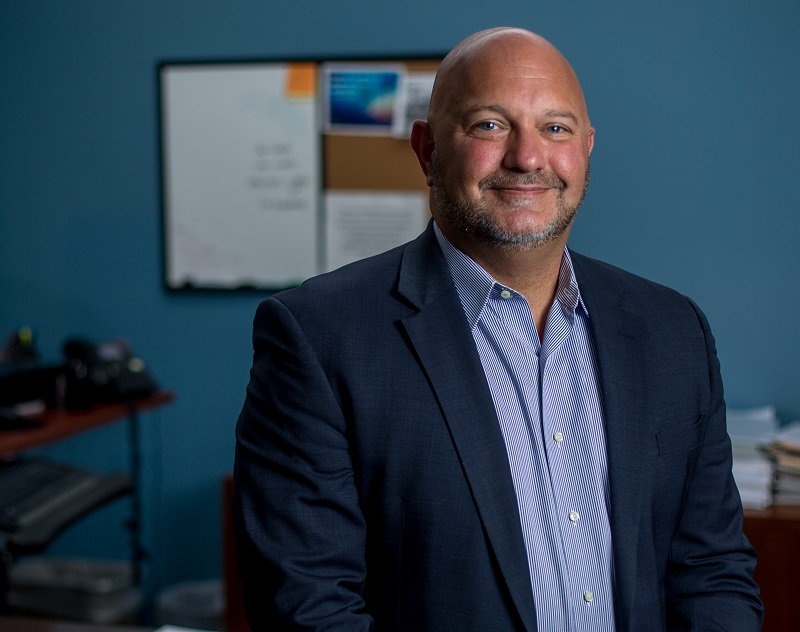
Kennedy is no stranger to NAIOP New Jersey, thanks to his experience in the public sector and with UTCA. He notes that he communicated with McGuinness and spoke at chapter events as deputy director of the state’s Office of Planning of Advocacy and as an assistant commissioner with the Department of Environmental Protection, where he spent a combined seven years from 2011 to 2017. He also attended events at McGuinness’ invitation, he said, “so I had a little bit of a flavor for the content and the type of not just advocacy and education, but the networking that NAIOP has done, and I’ve actually benefited from that in my career already.”
That created a good rapport ahead of the search process and during the transition period leading up to McGuinness’ retirement in late July, after more than 25 years in the post. Kennedy added that “the staff and the trustees deserved an orderly transition, and I think that’s what they’re getting” with respect to the day-to-day business, operational and accounting needs of the organization and its 800 members.
Kennedy also quipped that he has “been preparing for this role, unknowingly, for my whole career,” citing his positions in government, his exposure to infrastructure and trade association management with UTCA and his time on the Bordentown City planning board, which he currently chairs. That experience will be critical as he focuses on the chapter’s public policy agenda, including a new law championed by the industry that aims to speed up construction permitting in New Jersey, allowing developers to hire third-party, private-sector code inspectors if local officials cannot provide a timely review. Kennedy noted that the Department of Community Affairs has published a draft of the new rules and opened a comment period, so the chapter and other industry groups will be reviewing them “and making sure that the regulations live up to what the legislation required.”
He also pointed to the DEP’s newest flood hazard and stormwater regulations for inland properties, which require higher elevations for new construction to account for observed and projected increases in rainfall. NAIOP expects the agency to do the same for coastal properties, impacting areas from the Jersey Shore to the Hudson waterfront and highlighting the ongoing debate over the intersection of climate change and commercial real estate.
“We believe, of course, that climate change is real and, especially for coastal states like ours, has to be considered,” Kennedy said. “Real estate and economic development need to pivot to new technologies and better design to accommodate these realities. But state and federal government play a huge role in this, and we’re going to be working with them to make sure that the rules, as they change and evolve, are reasonable and incremental and that we can balance the needs of economic development and the needs for housing and places where we can work against what they’re projecting on climate change.”
Kennedy discussed those issues and more — including his other priorities and his approach to the job — during an interview in mid-August at NAIOP New Jersey’s headquarters in New Brunswick. Below are excerpts from the interview, edited for space and clarity.
Real Estate NJ: You were at the chapter’s big gala in May when it announced that Mike would retire and you would take his place. Assuming it was your introduction to many of the chapter’s 800 members, what did you learn that night about the organization?
Dan Kennedy: I think the number one thing that I learned is that NAOP members are active and they show up, and they care about not just the history of the organization, but the future of it. That was something that I was really blown away by at the event, with how the people that I encountered were really focused on not just their individual roles in the commercial real estate industry, but how NAIOP is really a key part of their success. There are a million trade associations out there … and I’ve been to all of them, basically. The feeling I got walking into the room was that NAIOP is the industry. It’s not just an obligation for people to attend. It’s something that people want to be a part of.
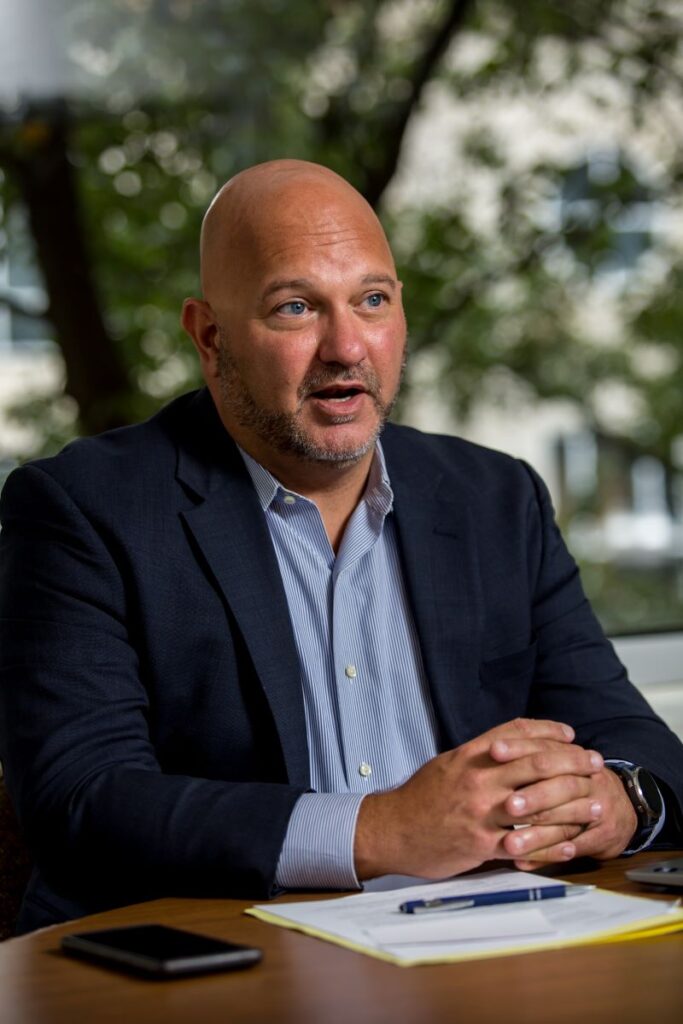
RENJ: It seems like your experience with UTCA made for a smoother transition to NAIOP. Do you feel that’s the case?
DK: I wouldn’t be here if it wasn’t for the time I spent with UTCA. I don’t think I would’ve been a viable candidate, because it was that trade association work, that experience, that I think set me apart from other folks they were looking at. I think our leadership and our board expect me to run the shop here and, if I run the shop well, it adds value to their shops.
RENJ: You have a long list of public policy issues to deal with as you begin your tenure. What about the landmark LSRP (Licensed Site Remediation Professional) program that has thrived for more than a decade and helped clean up polluted sites across the state, but is now dealing with delayed approvals by DEP?
DK: First, credit Commissioner (Shawn) LaTourette and Assistant Commissioner (David) Haymes for recognizing the challenges that LSRPs and the development community are facing with the DEP’s management under the law that was passed almost a generation ago. And they’ve acknowledged that there’s been a backsliding of this progress because of internal administrative decisions, and they’re working through some committees to see if they can’t get it back on track.
LSRPs’ independent professional judgment isn’t being respected like it should, and we at NAIOP will be helping and working with the (Licensed Site Remediation Professionals Association) … and others in the business community to make sure that we’re going to roll up our sleeves and work with the DEP … We’ll be looking forward in the coming months to working more closely with them on that, and this is the thing about NAIOP: We have engineers, lawyers, subject matter experts that are committee members and acting not just on their own individual behalf, but keeping the whole industry in mind. We can call on these experts that are members and (they) take the extra step to not just work for their own companies or their own clients, but keep the industry’s bigger picture in mind, which is something that makes us different and very strong.
RENJ: Outside of public policy, what are some of your other near-term priorities as CEO?
DK: We’re going to be recommending to the trustees to engage in a thoughtful strategic planning process that would start this fall. So, while I think that there are obvious things and obvious priorities outside of public policy for our organization to focus on, we’ll have a way to engage with our members, benchmark us against other strong NAIOP chapters nationally or similar organizations in the region and have an organizational assessment provided to us that will be the basis for a five-year strategic plan.
I’m a planner. I’ve done this for every organization that I’ve worked for. I know that I don’t have all the ideas, and I know that I’ve got a learning curve about this industry, so to overcome that, we’re going to be embarking on this process. We’re going to be doing some surveying of members and interviews with members, the benchmarking that I talked about, and over the winter receive information from an outside professional about what we do well, what we could maybe do better and how that impacts the things that we need to do.
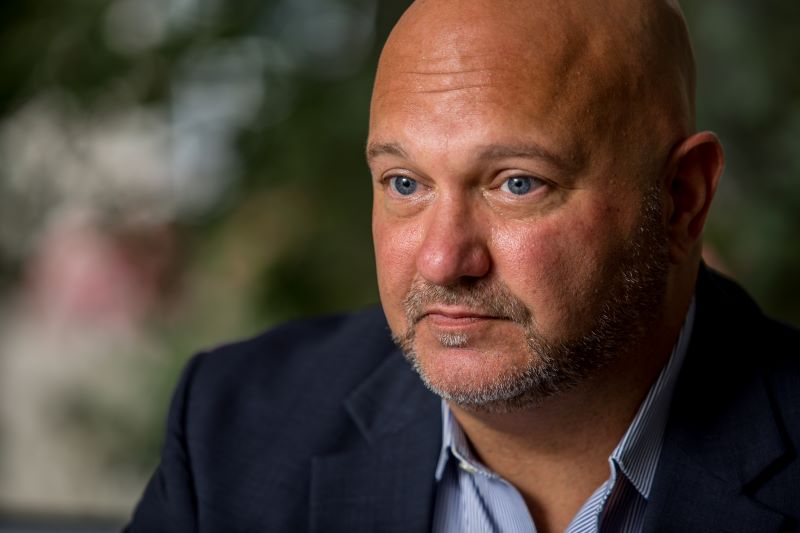
RENJ: What else should chapter members know about your leadership style?
DK: One thing I want them to know is that I’m not afraid of innovation and change, but I tend to be calculated before I act. So while folks may be bringing us ideas, as an organization that relies heavily on our operational income, you don’t really have the luxury to turn things upside down because we run off of dues and events. So they may see some changes, but it’s not going to be overnight.
I’m (also) more of a wonk than a flamethrower. So I think I’m very careful with building strong relationships that add value over time. I bring to the table a lot of those relationships already, and I try to conduct myself the right way. I think planners tend to be generalists — you know, the mile-wide, inch-deep kind of crowd — but I try to be deeper than that. And I really enjoy taking the time to find out what’s important to not just current members, but past leaders that are around but not as active and also emerging leaders. So I hope folks feel comfortable reaching out and grabbing a cup of coffee or a bourbon to just talk.
RENJ: What should people know about your career that they wouldn’t get from your written bio?
DK: I come from a family of entrepreneurs and business owners, so I tend to exhibit, I think, entrepreneurial behavior as I approach my work. Although I’ve been in government and trade associations my whole career that I didn’t create, I was raised in the back of an upholstery shop, essentially, in a downtown in Monmouth County, in Atlantic Highlands. … So that’s something people would not realize about me. They may see my resume and think I’m a recovering bureaucrat or a trade association guy. But my training really started as a child watching my mother run a business and paying the bills, inviting over her employees for Thanksgiving when they had nowhere to go, the care she took for her employees and how hard she worked just to make ends meet.

